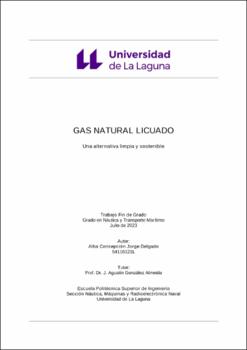Gas natural licuado: una alternativa limpia y sostenible.
Fecha
2023Resumen
Este trabajo de investigación aborda el tema de la contaminación marítima, indagando
en las causas subyacentes y las consecuencias devastadoras de un problema global. La
contaminación marítima es un desafío ambiental que afecta a los océanos y mares de todo el
mundo, poniendo en peligro la salud de los ecosistemas acuáticos, la vida marina y la calidad
de vida humana. A través de un análisis exhaustivo, se examinan las principales fuentes de
contaminación marítima causadas por los buques y su navegación, sus efectos perjudiciales
y las posibles soluciones para abordar este desafío. Tras las verificación de diferentes datos
recogidos en informes fundamentados, es posible llegar a soluciones sostenibles para un
futuro favorable empezando con pequeñas variaciones y/o sustituciones a niveles legales y
prácticos. Además, es necesario establecer parámetros a seguir en la elaboración de textos
fundados y procedimientos menos corrosivos y destructores en el medio marino relacionados
al uso de combustibles fuel, diésel o gasoil marino.
Es por ello que, el estudio se enfoca en analizar el impacto positivo y la reducción de
daños ambientales asociados al uso de buques de Gas Natural Licuado (GNL). Dicho
compuesto, se trata de un gas natural en fase líquida a -160 grados centígrados por lo cual
es considerado un líquido criogénico. Un litro de GNL equivale aproximadamente a 570 litros
de gas gaseoso a temperatura ambiente. Las ventajas principales de este combustible recaen
por un lado en ser incoloro e inodoro, por otro lado, se trata de un combustible sostenible ya
que no es tóxico ni corrosivo. Ahora mismo, el GNL es el único combustible alternativo cumple
con los límites de azufre establecidos por la Organización Marítima Internacional (OMI). Los
buques propulsados por GNL han surgido como una alternativa más limpia y sostenible en
comparación con los combustibles fósiles convencionales This research paper addresses the issue of maritime pollution, delving into the
underlying causes and devastating consequences of a global problem. Marine pollution is an
environmental challenge affecting oceans and seas around the world, endangering the health
of aquatic ecosystems, marine life and the quality of human life. Through a comprehensive
analysis, the main sources of maritime pollution caused by ships and their navigation, their
detrimental effects and possible solutions to address this challenge are examined. After
verification of different data collected in substantiated reports, it is possible to arrive at
sustainable solutions for a favourable future starting with small variations and/or substitutions
at legal and practical levels. Furthermore, it is necessary to establish parameters to be followed
in the elaboration of substantiated texts and less corrosive and destructive procedures in the
marine environment related to the use of fuel oil, diesel or marine gas oil.
For this reason, the study focuses on analyzing the positive impact and the reduction
of environmental damage associated with the use of Liquefied Natural Gas (LNG) ships. LNG
is a natural gas in liquid phase at -160 degrees Celsius and is therefore considered a cryogenic
liquid. One litter of LNG is equivalent to approximately 570 litters of gaseous gas at room
temperature. The main advantages of this fuel are that it is colourless and odourless, on the
one hand, and on the other hand, it is a sustainable fuel since it is non-toxic and non-corrosive.
Right now, LNG is the only alternative fuel that complies with the sulphur limits established by
the International Maritime Organization. LNG-powered ships have emerged as a cleaner and
more sustainable alternative to conventional fossil fuels





